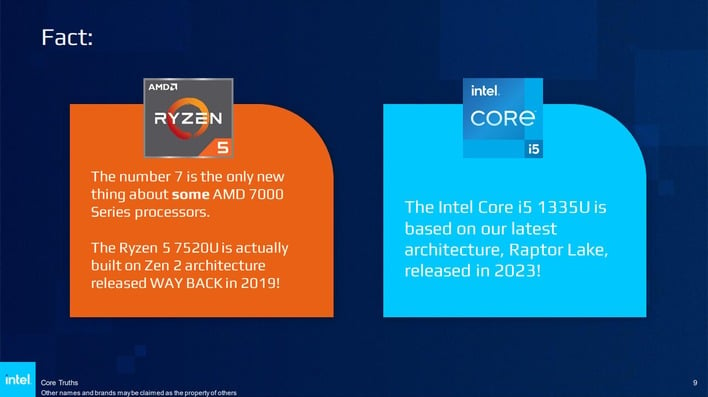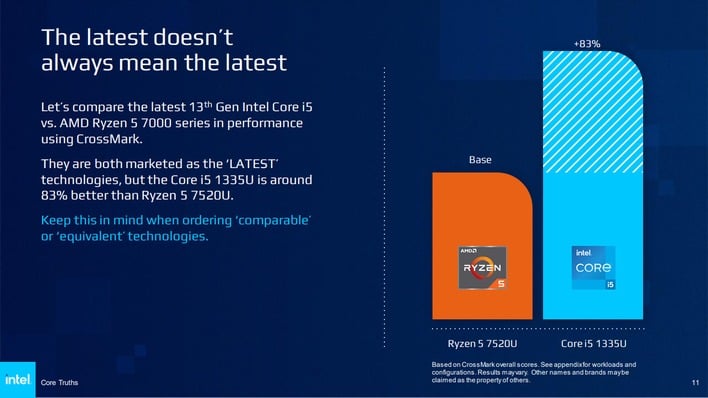Intel Seemingly Backtracks On Slides Comparing AMD's CPU Marketing To Snake Oil

Have some sympathy for marketers. They're on the front lines of the brand wars, fighting for mindshare as part of the eternal battle for market share. Like any soldiers in a war zone, sometimes marketers make risky decisions if they think it will give them a leg up on the enemy—questionable decisions like "comparing our competitor's product to snake oil."
The Ryzen 5 7520U is "Mendocino"—more comparable to an Alder Lake-N processor.
That's exactly what Intel did in a document that it has now removed from its website known as "Core Truths — How the Latest Technology is not always what it seems". The document is basically one long smear against longtime rival AMD for how the red team is selling CPUs with diverse core technologies, ranging from its older Zen 2 design all the way up to current-generation Zen 4.
We probably don't need to explain this to an audience of HotHardware readers, but AMD is hardly alone in shipping silicon sporting sections of IP that originate from years past. In fact, Intel itself is "guilty" of doing this as well—just take a look at most of the 13th-generation lineup, which is largely comprised of rebadged 12th-gen CPUs.
We say "guilty" in quotes because it's not like this is a crime. It's not even unusual; it's standard industry practice to continue to re-use proven older technology in newer designs. When you talk about stuff like the Ryzen 7 7735—essentially a re-branded Ryzen 6000 part—or Intel's own Core i5-13500 based on 12th-gen silicon, they might not be exciting, but they're perfectly capable and functional processors that deserve consideration.
AMD's CPU numbers can be confusing, but at least they're explicit about what they mean.
Intel also dunks on AMD's processor naming scheme, pointing out that the company's low-end Mendocino processors like its Ryzen 5 7520U are still based on Zen 2 cores, and that customers have to know that the "2" in the model number reflects this. The thing about this complaint is that AMD explicitly reflects the architecture in the model number. Intel doesn't do this. Ultimately, it comes off looking somewhat hypocritical, depending on your viewpoint.
Intel likely pulled the presentation because it was rather vicious in its critique of AMD, using terms like "selling half-truths to unsuspecting customers" and quite literally comparing AMD's marketing tactics to 19th-century hucksters selling snake oil. It's unprofessional, though we have to point out that AMD has done similar things (albeit more frequently with its other rival, NVIDIA.) Either way, we're glad calmer heads prevailed.
Thanks to @momomo_us for pointing out the deck.






